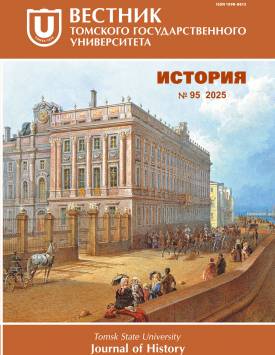Political orientation of Siberian and Far Eastern Jewry in 1918–1920: M. Novomeysky case study
Main purpose of the article is to provide the overview of political priorities of the Jewish population of Siberia and Far East during the 1918-1920 through political biography of Moshe Novomeysky (1873-1961). The researchers use Novomeysky's biography as an essential tool of microhistory approach in reconstruction of a broader historical picture of the period. Archival sources from the State Archive of the Russian Federation (GARF), State Archive of the Irkutsk region (GAIO) and personal archive of Moshe Novomeysky located in the National Library of Israel served as an article research basis. Political views of Moshe Novomeysky made transformation from being a social democrat in 1897 to a convinced Zionist in 1904. February revolution caught him in Saint Petersburg. In his short stay in central Russia he saw the opportunity to establish close contacts with some leaders of the world Zionist moment such as M. Ussishkin and some others. He was sure that promotion of a Palestine Zionist project could provide a strong foundation for revival of Jewish political life in Siberia and Far East. Besides, he was inspired by the Balfour declaration proclaiming a support for the establishment of a national home for Jewish people in Palestine. Novomeysky was a brilliant organizer and upon returning to Irkutsk at the beginning of 1918 he found himself strongly involved into organization of all-Siberian Zionist congresses. In November 1918 he became a member of the Presidium of the 3rd all-Siberian Zionist congress and in January 1919 he held an appointment of a head of the National Council of Jews of Siberia and Ural. Since February 1919 he initiated the publication of a weekly journal "Jewish Life" which became a common informative and political ground for the Siberian and Far Eastern Jewry and greatly contributed to formation of its political priorities. The consolidation of the Soviet power and the end of the Far Eastern republic forced Novomeysky to move to Shanghai. Here he initiated an educational project on publishing Jewish prayer books, textbooks and vocabularies for Jewish population of Siberia and the Far East, but unsuccessfully. He resumed the publication of the weekly journal "Sibir-Palestina", the only Russian-language Zionist edition in Siberia, Far East and Manchuria that was published until 1943 under its previous name "Jewish Life". In 1920 Novimeysky left his dreams about returning to Siberia and emigrated to Palestine instead, where he combined his activity as successful businessman and political activist. Moshe Novomeysky biography served as an illustration for a personal political initiative on the one hand, but on the other hand, demonstrated the lack of political experience of Siberian Jews who were inspired by personal charisma and chose to follow a Zionist idea. The authors declare no conflicts of interests.
Keywords
M.A. Novomeysky, Zionism in Russia, February Revolution, Jew in Siberia and Far East, Jewish periodicalsAuthors
| Name | Organization | |
| Vladimirsky Irena V. | Achva Academic College | irena@achva.ac.il |
| Gerasimova Victoria A. | Dostoevsky Omsk State University | gerasimova@bk.ru |
References

Political orientation of Siberian and Far Eastern Jewry in 1918–1920: M. Novomeysky case study | Tomsk State University Journal of History. 2025. № 95. DOI: 10.17223/19988613/95/3
